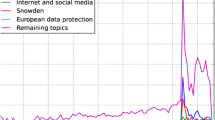Abstract
This study investigates whether average political bloggers engage in four distinct activities: informing readers, checking the media, engaging in political advocacy, and gathering money for charitable causes. Findings show that most bloggers inform their readers about articles in the media or to draw attention to key posts on other blogs. Somewhat less frequently, most bloggers write posts that detect errors or biases in the media. Bloggers use their blogs to pursue activist and philanthropist activities even less often. Ideology and traffic levels slightly affect the content and purpose of blog posts.
Similar content being viewed by others
References
Barber, B. R. (1998). The new telecommunications technology: endless frontier or the end of democracy? In R. G. Noll & M. E. Price (Eds.), A communications cornucopia. New York: Markle Foundation Essays on Information Policy.
Bennett, D., & Fielding, P. (1999). The net effect: how cyberadvocacy is changing the political landscape. Merrifield: E-advocates Press.
Bimber, B. A. (2003). Information and American democracy: technology in the evolution of political power, communication, society, and politics. New York: Cambridge University Press.
Bowers, C., & Stoller, M. (2005, August 10). Emergence of the progressive blogosphere: a new force in American politics. Washington: New Politics Institute. Retrieved May 4, 2007 from http://www.newpolitics.net/files/The-Emergence-of-the-Progressive-Blogosphere.pdf.
Browning, G. (1996). Electronic democracy: using the Internet to influence American politics. Medford: Information Today.
Catalano, M. (2005). Kids of Katrina/food goods drive. A small victory. Retrieved May 5, 2007 from http://asmallvictory.net/katrina.html.
Chang, S., et al. (2005, April). Blogging survey report. University of Florida, College of Journalism and Communications.
Crawford, S., & McCabe, S., et al. (2002). From mail to web: improving response rates and data collection efficiencies. Paper presented at the international conference on improving surveys, Copenhagen, Denmark.
Davis, R. (1999). The web of politics: the Internet’s impact on the American political system. New York: Oxford University Press.
Davis, S., Elin, L., & Reeher, G. (2002). Click on democracy: the Internet’s power to change political apathy into civic action. Boulder: Westview Press.
Drezner, D., & Farrell, H., (2007). The power and politics of blogs. In D. Drezner & H. Farrell (Eds.), Will the revolution be blogged? Public Choice. Special Issue.
Farhi, P. (2006, August 9). Blogger takes aim at news media and makes a direct hit. Washington Post, p. C1.
Goyder, J. (1985, Summer). Face-to-face interviews and mailed questionnaires: the net difference in response rates. Public Opinion Quarterly, 49(2), 234–252.
Hewitt, H. (2005). Blog: understanding the information reformation that’s changing your world. Nashville: Nelson Books.
Internet Week (2004). SEA-EAT blog mobilizes fast for tsunami relief. Dec. 29, p. NA.
Jarvis, J. (2005, September 5). Recovery 2.0: A call to convene. Buzz machine. Retrieved May 5, 2007 from http://www.buzzmachine.com/index.php/2005/09/05/recovery-20-a-call-to-convene/.
Justice, G. (2004, November 6). Kerry kept money coming with the Internet as his ATM. New York Times, Sect. A, col. 1, p. 12.
Kaye, B. K. (2005). It’s a blog, blog, blog world: users and uses of weblogs. Atlantic Journal of Communication, 13, 73–95.
Kennedy School of Government Case Program (2004). “Big media” meets the “bloggers”: coverage of Trent Lott’s remarks at Strom Thurmond’s birthday party. Cambridge: Harvard College.
Klam, M. (2004, September 26). Fear and laptops on the campaign trail. New York Times Magazine, p. 42.
Lillkvist, M. (2004, March 15). Blogs grow up: ads on the sites are taking off. Wall Street Journal, Sect. B, p. 1.
McKenna, L. (2007). “Getting the word out”: policy bloggers use their soap box to make change. Review of Policy Research, 24(3).
McKenna, L., & Pole, A. (2004, September). Do blogs matter? Weblogs in American politics. Paper presented at the American Political Science Association’s annual meeting, Chicago, IL.
“Measuring the Blogosphere” (2005, August 6). New York Times, Editorial Desk. Sect. A, col. 1, p. 14.
Nardi, B. A., Schiano, D. J., Gumbrecht, M., & Swartz, L. (2004). Why We Blog. Communications of the ACM [Electronic version], 47(12), 41–46.
O’Connell, P. L. (2005, November 14). Internet matchmaking: those offering help and those needing it. New York Times, Sect. F, p. 26.
Pole, A. (2005). E-mocracy: information technology and the New York and Vermont state legislatures. State and Local Government Review, 37(1).
Posner, R. (2005, July 31). Bad news. The New York Times book review, p. 1.
Ramos, M., & Piper, P. S. (2005). Web waves. Searcher, 13(5), 32–39.
Reynolds, G. (2005, September 1). Instapundit. Retrieved May 5, 2007 from http://instapundit.com/archives/025235.php.
Trippi, J. (2004). The revolution will not be televised: democracy, the Internet, and the overthrow of everything. New York: Regan Books.
Verba, S., Schlozman, K. L., & Brady, H. (1995). Voice and equality civic voluntarism in American politics. Boston: Harvard University Press.
Wallsten, K. (2005, September). Political blogs and the bloggers who blog them: is the political blogosphere and echo chamber? Paper presented at the American Political Science Association’s annual meeting, Washington, DC.
West, D. (2005). Digital Government technology and public sector performance. New Jersey: Princeton University Press.
Wright, R. (2005). Web donations, blogs mark trend. VARBusiness, 21(3), 20.
Author information
Authors and Affiliations
Corresponding author
Rights and permissions
About this article
Cite this article
McKenna, L., Pole, A. What do bloggers do: an average day on an average political blog. Public Choice 134, 97–108 (2008). https://doi.org/10.1007/s11127-007-9203-8
Received:
Accepted:
Published:
Issue Date:
DOI: https://doi.org/10.1007/s11127-007-9203-8




